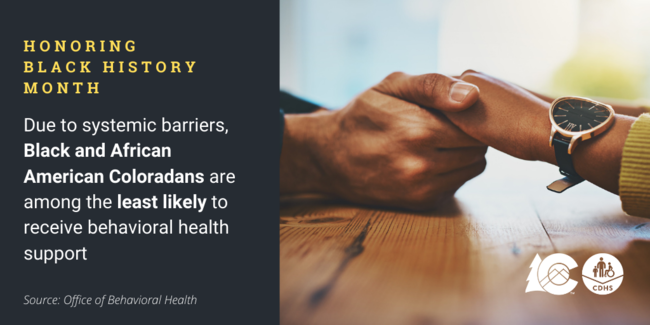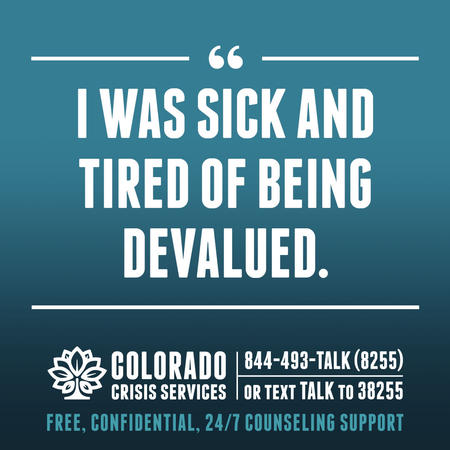Feb. 25, 2021: As we celebrate our state’s diverse Black and African American communities this month, it’s important we back up words with action. Last summer, Governor Polis signed an executive order that requires agencies to prioritize equity, diversity and inclusion efforts, and the Colorado Department of Human Services, Office of Behavioral Health is taking a hard look at how we can improve. Given the compounding forces of racism, the economic downturn and an unprecedented public health crisis that has disproportionately hit Black communities, we can and must do better in providing equitable access to mental health and substance use care.
What we know
Though mental health and substance use disorders affect Coloradans of all backgrounds, the state has not always provided equitable access to treatment and services. Surveys conducted as part of our 2020 Needs Assessment, in partnership with Health Management Associates (HMA), found that Black Coloradans are among the least likely to receive needed behavioral health support. Worse, when Black Coloradans managed to get care, 90% did so in a public human service setting, such as child welfare, juvenile justice and corrections. This suggests that we are not intervening early enough to get Black Coloradans into appropriate care settings.
These disparities stem from a host of systemic problems. Facing racism and discrimination can negatively affect mental health in myriad ways, as this National Institute of Health article suggests. A dearth of culturally-competent providers in Colorado’s behavioral health system, reported in the Needs Assessment, means Black Coloradans often have trouble finding a clinician who can relate to their experiences. Black Coloradans are also more likely to be uninsured, presenting a huge barrier to accessing care.
What we’re doing
OBH is committed to closing these gaps. Our cultural competency teams are drafting an office-wide equity plan to improve our policies, programming and community engagement. We also hired an outside consultant to help guide these strategies and create a sustainable, five-year plan.
To improve access, we are also using primary research to retool our Colorado Crisis Services and Lift The Label marketing campaigns, which connect Coloradans and their loved ones to lifesaving treatment. Our analysis found that previous campaigns can do a better job to reach people of color on a meaningful scale. After months of focus groups and research, we are considering new approaches, messages and resources that can reach Black audiences in more culturally relevant ways.
This week, we also launched an equity grants program so we can partner with community organizations to build trust, raise awareness of our services and identify community-based approaches to mental health support. If you want to apply, or know of an organization that would be interested, search for solicitation 2021000457 on the state’s procurement website.
At the state level, Colorado is embedding equity into behavioral health reform. A bill was introduced this month to establish a new Behavioral Health Administration (BHA) that would be the single state agency that would lead, promote and administer the state's behavioral health priorities. The BHA would help Colorado take a statewide approach in rolling out cultural competency standards, recruiting and retaining a diverse workforce and improving data collection so we can see who we’re serving—and who we’re not.
Where we go next
While we’re proud of these steps, we know we have much further to go to advancing equity in behavioral health care and rooting out anti-Black racism in our system. We will continue to reflect, question and hold ourselves accountable for better outcomes.

